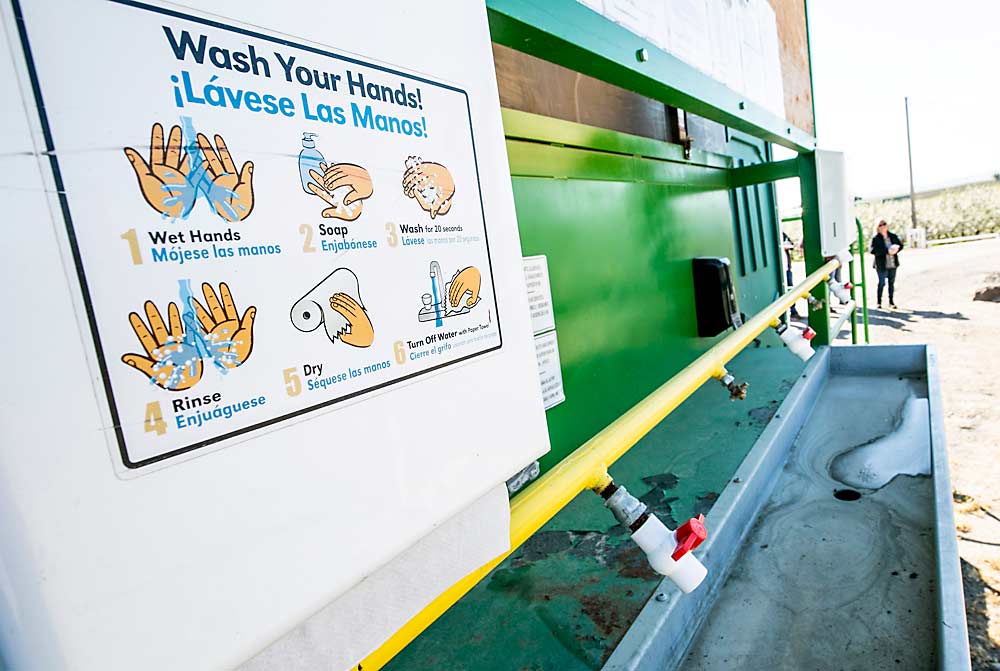
By now, the coronavirus is a known workplace threat in agriculture, and employers are required to protect their workers from it.
That makes sanitation an enforcement priority for workplace safety regulators this season.
“We’ve been very active right now in ag and responding to complaints and performing inspections,” said Tim Church, a spokesman for the Washington State Department of Labor and Industries, which regulates workplace safety.
Growers should expect enforcement elsewhere in the country from federal authorities, too, said Mike Rios, Southeast Region agriculture enforcement coordinator for the Wage and Hour Division of the U.S. Department of Labor.
“If you think you needed to be careful with field sanitation in the past, please understand how much more careful you as an employer should be related to field sanitation because of this pandemic,” Rios said.
In Washington, safety authorities do not have to wait for a complaint or injury to inspect a farm or packing facility. However, this year, complaints are prompting a high percentage of Labor and Industries agricultural inspections and the bulk are related to the coronavirus, Church said. Common complaints include handwashing stations missing soap, a lack of social distancing or issues with masks.
Before this year, complaints prompted one-third of unscheduled agricultural inspections over a six-year average. Fatalities or injuries drove 23 percent, while 44 percent happened just because the agency decided to inspect proactively.
From January through May, however, half of the agricultural inspections were spurred by complaints, while only
5 percent were due to injury or fatality. The proactive inspections were about the same.
The statistics do not include consultations, which are scheduled in advance by employers, though the agency has done a lot of those this year, too.
“We’re getting a lot of complaints related to coronavirus, and I think that is in part due to the evolving nature of it,” Church said.
Since early March, federal and state health authorities have sporadically released and updated guidelines, fact sheets and temporary rules, creating a shifting landscape of regulation as health experts learned more about the disease.
The good news, Church said, is that the agency has found few violations related to the coronavirus in agriculture.
Yakima County, which had one of the highest coronavirus case rates on the West Coast, was a hot spot for complaints, Church said. In May, Labor and Industries received about 200 complaints related to five Yakima-area fruit packers, most of them delivered together by advocate groups, Church said. The agency opened inspections on all five and found no violations. Since then, the agency has received a few more complaints and opened new inspections, but the results were still pending as of Good Fruit Grower’s press deadline.
In the Southeast, federal authorities often take the lead in workplace safety enforcement, Rios said. The Wage and Hour Division of the Department of Labor inspects for pay issues but also responds to hazard concerns.
The pandemic grounded the agency for many weeks, and in June the regulators were still finalizing their protocols for field investigations. It was unclear at the time if they would be enforcing social distancing or other guidelines from the federal Centers for Disease Control.
“It’s easier said than done,” Rios said.
However, he cautioned growers that violations that would have been considered minor in other years will be treated more seriously this year due to the risks of the coronavirus. First-time penalties outlined by the Occupational Safety and Health Administration for infractions such as not providing soap or not cleaning portable toilets can reach up to $13,494.
He urges growers to know the rules but manage for safety, not just for rules.
“The law is a floor … a bare minimum,” he said. “If that’s all you strive to reach, you’re doing it wrong.” •
—by Ross Courtney
Related:
—Farming amid the coronavirus






Leave A Comment